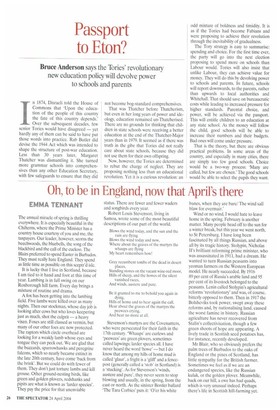Passport to Eton?
Bruce Anderson says the Tories' revolutionary new education policy will devolve power to schools and parents
n 1874, Disraeli told the House of Commons that 'Upon the education of the people of this country the fate of this country depends.' Over the subsequent decades, few senior Tories would have disagreed — yet hardly any of them can be said to have put those words into practice. Rab Butler did devise the 1944 Act which was intended to shape the structure of post-war education. Less than 30 years later, Margaret Thatcher was dismantling it. She turned more grammar schools into comprehensives than any other Education Secretary, with few safeguards to ensure that they did not become bog-standard comprehensives.
That was Thatcher before Thatcherism, but even in her long years of power and ideology, education remained un-Thatcherised. There are no grounds for thinking that children in state schools were receiving a better education at the end of the Thatcher-Major years than in 1979. It seemed as if there was truth in the gibe that Tories did not really care about state schools, because they did not use them for their own offspring.
Now, however, the Tories are determined to rebut the charge of neglect. They are proposing nothing less than an educational revolution. Yet it is a curious revolution: an odd mixture of boldness and timidity. It is as if the Tories had become Fabians and were proposing to achieve their revolution through the inevitability of gradualness.
The Tory strategy is easy to summarise: spending and choice. For the first time ever, the party will go into the next election proposing to spend more on schools than Labour would. Tories will also insist that unlike Labour, they can achieve value for money. They will do this by devolving power to schools and parents. In future, schools will report downwards, to the parents, rather than upwards to local authorities and Whitehall. That should save on bureaucratic costs while leading to increased pressure for higher standards. Parental choice, and power, will be achieved via the passport. This will entitle children to an education at any state school. As the money will follow the child, good schools will be able to increase their numbers and their budgets. Bad ones will come under pressure.
That is the theory, but there are obvious practical problems. In some areas of the country, and especially in many cities, there are simply too few good schools. Choice would be a two-way process: 'Many are called, but few are chosen.' The good schools would be able to select the pupils they want.


















































































 Previous page
Previous page